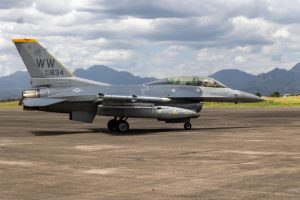More than one month after the announcement that the United States would be granted access to four more military bases in the Philippines, the U.S. started rehabilitating the runway of the Basa Air Base in Pampanga on March 20. The Philippines’ fast-growing defense cooperation with the United States may lead to the relations between China and the Philippines going backwards.
The U.S.-funded rehabilitation of the runway inside the Philippines’ Basa Air Base started on March 20, with an expected total cost of $25 million. Secretary of the U.S. Air Force Frank Kendall and Philippine Department of National Defense Officer-in-Charge Carlito Galvez Jr. led the groundbreaking ceremony together. Kendall said: “The rehabilitation is a manifestation of our Enhanced Defense Cooperation Agreement (EDCA), a key pillar of the U.S.-Philippine alliance. The two countries’ relations are at a turning point.”
Galvez added that the implementation of the EDCA is now in full swing and he hopes that the United States will consider more EDCA projects to strengthen the Philippines capabilities in defending national sovereignty.
The EDCA was originally drafted in 2014, granting the United States access to five military bases in the Philippines. During U.S. Defense Secretary Lloyd Austin’s Philippine tour in February 2023, the agreement added four additional sites for use by U.S. forces, though the locations of the new sites wasn’t revealed at that time.
Reuters quoted a retired Philippines general as saying that the bases requested by the United States are located in Isabela, Zambales, and Cagayan provinces, all of which are near the Taiwan Strait and the South China Sea.
On March 22, Philippine President Ferdinand Marcos, Jr., told a news conference without elaborating that, under the expanded EDCA, U.S. forces would be allowed access to bases “scattered around the Philippines” – including in the northern Philippines, which is near the Taiwan Strait, and western Palawan province, which faces the South China Sea. Marcos underscored that the moves were meant to boost the country’s coastal defense, though it was criticized by the local governments in the northern Cagayan province.
From the Chinese perspective, the location of these four sites is very targeted, with three of them near the Taiwan Strait and one facing the South China Sea. It demonstrates that the United States, which has been keeping close tab on the Taiwan Strait and the South China Sea, is preparing for possible military conflicts in these troubled waters. Meanwhile, by giving wider access to U.S. troops, the Philippines has made it very clear that if military conflicts were to break out in the region, it will stand with the United States.
The rehabilitation project at Basa Air Base means that the U.S. Air Force can take off from the Philippine base and go to Taiwan or the South China Sea, which is much closer than taking off from Guam military base. Also, the U.S. Army can store weapons and ammunition in Philippine bases, greatly shortening the logistics supply line and improving combat efficiency during the wars.
If there is a conflict, the command system of the United States and the Philippines is relatively sound, and the four bases can help the U.S. military and the Philippines to respond quickly in a short period of time during the wars.
In addition, the current joint military exercises between the United States and the Philippines appear to be aimed at seizing disputed reefs and islands controlled by China.
Next month’s annual military exercise, known as Balikatan, will be the largest joint Philippine-U.S. military exercise in history, with about 17,600 military personnel expected to take part in the drills. Both Austin and Galvez welcomed the upcoming exercises and further discussed plans for joint maritime activities in the South China Sea.
In fact, since Marcos came to power, the defense cooperation between the Philippines and the United States has made a major breakthrough. The United States is trying its best to pull the Philippines into its anti-China camp.
The expanded EDCA and the military drills between the Philippines and the United States will thus take a toll on the relations between China and the Philippines.
The recent intensification in the territorial and maritime disputes between China and the Philippines in the South China Sea can be attributed to the historic shift of the Philippines’ role in the U.S. Indo-Pacific Strategy. At least in the security domain, the Philippines is the most deeply integrated Southeast Asian country in the Indo-Pacific Strategy.
Moreover, there is a possibility that the United States, Japan, Australia, and the Philippines will patrol the South China Sea in the near future, as the Philippines wants more enhanced military cooperation with the United States and its allies to strengthen Manila’s hand in dealing with China in the South China Sea.
Frankly speaking, it is understandable for the United States and the Philippines to develop military relations, as they are traditional security allies. Nonetheless, the Philippines should be aware of China’s bottom line. If the Philippine-U.S. defense cooperation is highly targeted, especially if it involves the Taiwan Strait, China will definitely consider it an unfriendly act and take counteractions.
In that regard, the recent declaration by the Chinese embassy in Manila that the Philippines-U.S. military cooperation could “seriously harm Philippine national interests” is a clear warning to the Philippines.

































